Common Types of Threaded Fasteners
June 22,2022
Brass Fasteners supplier,Customized thread rod,Internal And External Thread Nut supplier
The three primary types of threaded fasteners are nuts, bolts, and screws. Most fasteners are made of stainless steel or carbon steel, however there are also threaded fasteners made from other metals or alloys including titanium, copper, aluminum, nickel, and bronze.

Screws
A screw has a slotted head that allows you to twist its pointed end into material to fasten two objects together. You use a screwdriver or drill to install the screw into wood or other material. The most common screw heads are:
- Phillips head: Features a cross-shaped slot on the screw head
- Flathead: Similar to Phillips head, except it has one horizontal slot
- Hex: Features a hexagon-shaped slot on its head
- Torx: Features a star-shaped slot on its head
There are dozens of types of screws, but most fall into two broad categories: screws that require you to drill a pilot hole before installing the screw and so-called self-drilling screws that don’t require a predrilled hole. Some common types of screws include:
- Wood screws: These screws—which are made of metal—are designed to connect two or more wood pieces. Typically, they’re self-driving screws partially threaded with a smooth upper shank to prevent the screw head from driving deep into the wood. Many homeowners use some variation of wood screws for a variety of purposes.
- Masonry screws: These screws have a flat tip and require a predrilled hole. Most masonry screws have hex heads that are raised instead of slots. You can use them for attaching wood to concrete or metal.
- Sheet metal screws: These screws are fully threaded with sharp points to drive into metal, wood, or hard plastic.
- Lag screws: Sometimes called lag bolts, these sturdy screws have a square or hex head and are typically driven with a wrench. You use them for heavy applications like roofing.
- Machine screws: There are a wide variety of machine screws that are used in machining and manufacturing applications. They are ¼ inch or less in diameter, and their primary use is to hold metal objects together. Manufacturers design them to fit precisely with the parts they will fasten.
Bolts
Most bolts are threaded only at the flat end of their shaft. The primary difference between bolts and screws is that bolts require a nut to create tension and screws don’t. In addition, screws are not meant to pass completely through the material while bolts must pass all the way through in order to make a connection with the nut. Common types of bolts include:
- Carriage bolts: Featuring a round head without slots that you secure in place with a nut, it’s commonly used to fasten wood with wood or wood with metal.
- Hex bolts: These versatile bolts have hex heads that are useful in tight spaces.
- Stove bolts: This general-purpose bolt has a slotted head that allows you to use a screwdriver to fasten it to a bolt. Their shafts are almost fully threaded.
- Machine bolts: Most have hex heads and require you to use a wrench or socket to fasten them. They’re commonly used to secure wood with wood or wood with metal.
Nuts
Nuts are circular-shaped or hex-shaped pieces of metal with a threaded interior surface. Nuts are used in conjunction with bolts to fasten parts together. Some common types of nuts are:
- Dome nuts: Also known as acorn nuts or cap nuts, they have a distinctive domed top. These nuts often are used for aesthetic purposes because they cover the threaded end of a screw or bolt.
- Hex nuts: These nuts are hexagons with six sides. They are multipurpose nuts that you can use with most types of fasteners. Some common hex nuts include:
Hex finish nuts: The most used nut worldwide, they fasten with bolts to create a tight joint for many common applications.
Hex jam nuts: A thin nut about half the thickness of a regular hex nut and “jammed” against a hex nut on a bolt. You tighten the bolts against each other rather than against the material’s surface to protect the material from damage.
Heavy hex nuts: A hex nut made with thick walls to support heavier loads.
- Serrated flange nuts: These are hex nuts with an integrated wide flange washer that doesn’t spin or move. Serrations under the washer provide a locking action that prevents the nut from loosening from the fastener. Because of the serrations, you shouldn’t use these nuts on surfaces vulnerable to scratches.
Conclusion
For more information about Brass Fasteners supplier,Customized thread rod,Internal And External Thread Nut supplier, we are glad to answer for you.